|
Oh Dae-su (Choi) is kidnapped and thrown in a private prison without any justification whatsoever being given to him. He spends fifteen years imprisoned, alone, in a bedroom with a toilet and a TV set which allows him to keep in touch with the changes in the outside world. The room is regularly imbued with soporiferous gas, which precedes the kidnappers' intervention to clean up or to cut his hair, without the prisoner ever exchanging words with another human being.
After his release, Dae-su is focused only in revenge; in finding out who was responsible for his imprisonment and what were the reasons. But the task does not appear to be easy; he must adjust to another reality, fifteen years ahead of him, and he is a murder suspect of a homicide occurred during his captivity. Mido (Kang), a cold-handed sushi cook will help him find an answer for the question on his mind: why? The film was adapted from a 1997 eight volume manga, written by Tsuchiya Garon with drawings by Minegishi Nobuaki.
Since Oldboy presents several narrative surprises it is not advisable to read much about it before watching the film. In this text, we avoid descriptions of screenplay particularities that the viewer should only disclose when viewing it.
Park Chan-uk’s last film is the second one of a Trilogy of Vengeance which began with the wonderful Sympathy for Mr. Vengeance/Boksuneun Naeui Geot (2002). It arrived at Cannes without any expectations on the part of the press reports that usually anticipate the festival. Not even the Cahiers du Cinéma appeared to have ever heard of the director or of his former films, such as the one already mentioned or Joint Security Area.
It is only natural that one would expect more attention to the most famous directors of the milieu, namely Wong Kar-wai or Pedro Almodóvar, but when the list of the “Asian promises” at the competition includes almost every title present with the exception of Oldboy that is a clear symptom of the lack of expression the South Korean cinema has amidst the West and how its importance is minimized — at least, until now — on the context of “one of the most important film festivals in Europe”, to put it in the mild words of a very restrained local television news presenter.
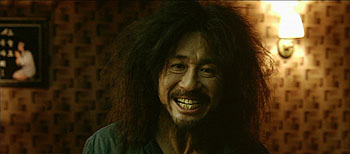 |
Oh Dae-su is imprisoned in a private cell, for 15 years. |
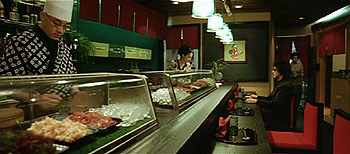 |
The sushi moment.
|
Quentin Tarantino, president of the jury at the Cannes Film Festival, had an idea of what might be expected, for he already knew Park's work and was more alert to the rumors coming from Asia than the press covering the event. On the other hand, perhaps he should have kept his mouth shut instead of making all those comments about films that had not yet been screened, thus amplifying the hype.
This is not the kind of film that brings about consensus, due to the director’s rawness and desire not to soften any violent consequences of actions born from a blind wish for vengeance. Some people were impressed (or even shocked) by the depicted violence and the consequent myriad of comments reporting that feeling might contribute to prepare the viewers to constant dismemberment and blood splashing on the walls every five minutes. But Oldboy is less violent than Park Chan-uk’s former film, with its long torture scenes, graphic mutilation and rivers of blood spurring high. Here, well, torture is brief, mutilation less graphic and the blood does not splash farther than a foot.
Some of the violence in Oldboy is suggested rather than presented. If we pay attention to an example given by Roger Ebert, one scene involving the unwilling extraction of healthy teeth from a character, we just see the beginning of the act and its consequence (we could compare it to the notorious cutting-of-the-ear scene in Reservoir Dogs, which many people would swear to be particularly graphic, even though the camera moves away).
The fact that so many feel disturbed by the "excess" of violence in Oldboy will permit us, mainly, to assert the film's emotional impact, even if Park's work is, formally, cold and detached. Ebert, a reference amidst US' critics, is also known by his moments of exceptional sensitivity. The ultimate example is his review of David Lynch's Blue Velvet in which he panned the film, because of the "abuse" towards Isabella Rosselini, "forced" to shoot an emotional scene while bare naked.
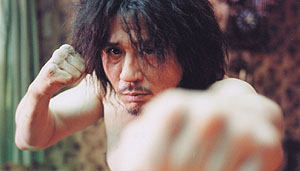 |
Choi Min-sik (Dae-su).
|
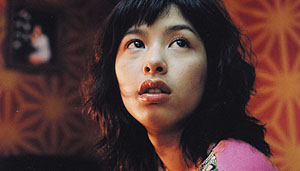 |
Kang Hye-jeong (Mi-do).
|
There is another shocking moment usually referred to and that the director commented on his passage through Cannes (1). It does not come as a “surprise” in the film and, if it ever were, it would cease to be, for it was destined to become “the question” to place before the director or the actor Choi Min-sik. In either case, the reader (especially, if a vegetarian) may choose to jump to the next paragraph. The scene is the one in which Dae-su eats an octopus. An entire, alive and kicking octopus. Well, in Korea, it is usual for people to eat kicking octopuses. The novelty is that Dae-su dismisses that part in which the animal is cut in order to be ingested piece by piece.
This gastronomic interlude is not very well accepted by some of those who say that there is no concern for animal well being in South Korea. It is also a fact that the late octopus' well being was not assured and this can be checked by anyone watching the film. But the issue here is, at most, a cultural one and not one about animals' rights (considering the context of a society where it is usual to kill animals for food). The issue would only be a different one if the cephalopod had been killed needlessly; is it obvious that, in this case, it was used as food. This shock or disgust will not obviously bear the same impact in an Iberian country, where animals are bled for the sole purpose of recreation than, for instance, in the USA where the connection between living beings and their place at the table has become more diffuse.
We are being presented a genre film, a dark thriller, but it is also an essay on revenge, its boundaries and its consequences. It would be less than interesting to develop a two hour film only to say that vengeance leads nowhere, that violence begets violence, etc. Park Chan-uk uses this theme as a narrative element, creating a film for the mass audiences (at least in Asia), with a well-written screenplay that unrolls and unfolds at the right moments. The cast is the ideal one. Choi Min-sik and Kang Hye-jeong go very well, as most of the supporting cast. On the other hand, Yu Ji-tae did not appear irreplaceable to me.
Choi Min-sik, already known to Portuguese audiences by Drunk on Women and Painting/Chwihwaseon (2002), perfectly embodies a character with nothing to loose and succeeds in passing on an impressive force and agility, convincing us to accept the excesses in some of the fights. Choi is an actor with remarkable amplitude, as we may verify from several of his performances, comparing, for instance, the Dae-su in Oldboy to the frustrated gangster in Failan (2001). Kang Hye-jeong appeared formerly in the low-budget DV production Butterfly/Nabi, a melancholic and little philosophical science fiction curiosity, shown at the 2002 Fantasporto Film Festival, and found here a catapult for a promising career.
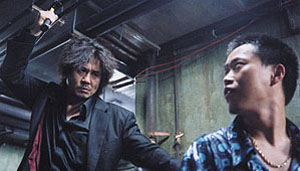 |
Dae-su does not leave home without his pet-hammer. |
If we find the text to be a strict and complex one, the visual composition provides us with a completely different level to appreciate this work. The photography is an attentive one, the frames carefully composed and the camera movements are natural and spontaneous. Consider the shot in the hall opposing Dae-su to a group of men armed with knives and sticks. All the formal choices turn out to be appropriate to tell the story. Beyond that long traveling shot, illustrating the ability to resist beyond unsustainable limits, fed by rage and the desire for vengeance, the editing is adapted to each scene's tone and to Dae-su’s state of mind: at the beginning of the film, the drunkenness is reflected by using endless jump cuts.
There is no moral in Park’s films — any judgment is left for the viewer. JSA, another film where there is an investigation to the past, the flashback bearing a greater narrative relevance, already revealed the director’s impartiality. Oldboy bears more resemblance, formal and narrative, to Sympathy for Mr. Vengeance. Park composes a dark world, submerged in darkness, which is gradually unfolded as the “heroes” are forced to confront that environment. In both films, there are organized criminals providing socially repulsive services to whoever is willing to pay: private imprisonment in the first film, human organs in the second. Moral needs not to be preached: the results from the actions speak for themselves and in no moment the violence spurring in the characters' path is glorified – Choi in Oldboy, Song Kang-ho in Sympathy for Mr. Vengeance.
Sex also plays a similar role in these two parts of Park Chan-uk’s Trilogy of Vengeance. There is no foreplay to the sound of soft music; we go straight to an act between tenderness and crudeness, with no room for sweet words. It is an act of consummation clouded by an invisible countdown, illustrating an end-of-time despair, as if the characters felt the future to be very dark and time slipping through their fingers. The last chance to love, we could say. Even if it is not romance that remains in our memory after watching either film, Oldboy is, after all, also a love story.

(1) In an interview at Cannes, Park Chan-uk said “to regret” that the octopuses had to die. But the text appears to suggest some irony. Later in that same text, Park says to expect the director chosen for the American remake of his film not to be very talented in order for him to save face. |

